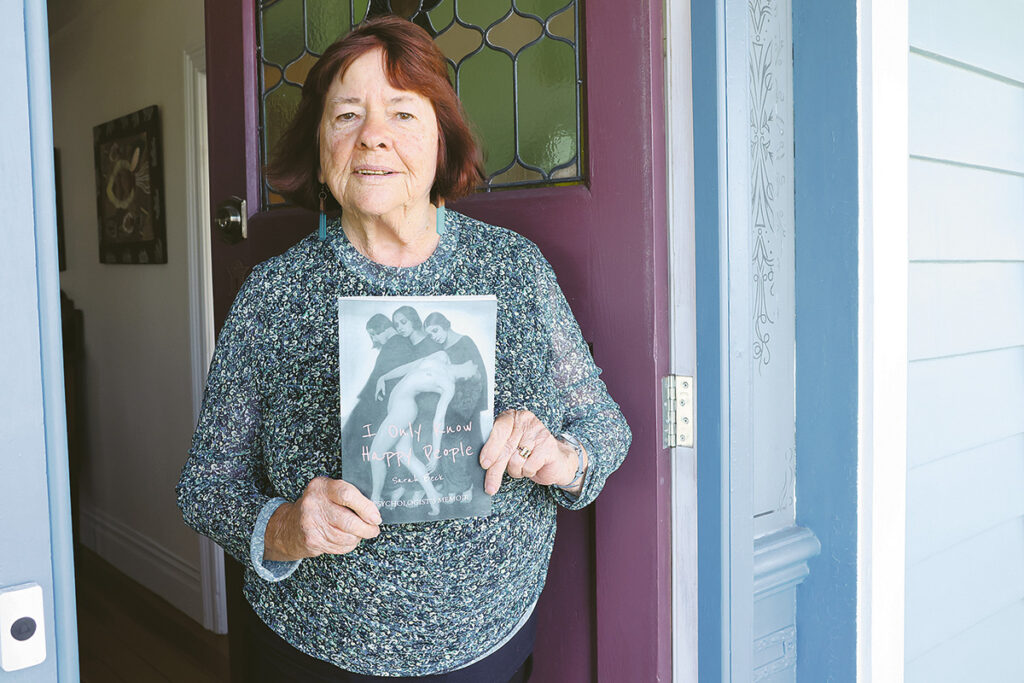What's New
19 April, 2024
Literary Dame’s daughter lifts lid on tough times
At nearly 80, psychologist Sarah Beck has written a memoir that describes her troubled relationship with her late mother, Christine Cole-Catley. Helen Vause reports.

Her story… Sarah Beck’s memoir tells of her feelings of abandonment as an infant and challenges later in life, including her own parenting struggles
Psychologist Sarah Beck is no stranger to the poignant tales of others. But it is her own troubled story and often painful relationship with her late mother that moved her to write a memoir as she approaches her 80th birthday.
While the stories of fraught mother and daughter relationships and sad childhood memories are common enough, Sarah’s soon-to-be-published book talks about the events that she says shaped her life as the daughter of the widely known former Devonport resident Chris Cole-Catley.
The late Cole-Catley was an effervescent character who was still running her publishing business from home in Ngataringa Rd when she died in 2011. Latterly, she was a publisher and author, but her working life began in the 1940s when, as a young graduate in her early 20s, she broke into the largely male world of journalism, becoming a reporter on a Wellington daily. She was one of the pioneering women in this country’s tough newspaper business. But she was also the single mother of baby Sarah when this career opportunity arose. Keen to grab it, she faced the dilemma of many mothers: how could she balance motherhood and a full-on job?
Beck’s version of how life went with her mother from then onwards, recounted in her memoir, I Only Know Happy People, is a raw and often painful read.
Beck says she made the decision to leave New Zealand to ‘get away’, in her late teens, fleeing a rough home life despite the guilt she felt at leaving her mother and younger siblings.
In her own early career there were stints in journalism and writing, and briefly in television, before she became a psychologist.
She worked with communities in Northern Queensland, but later lived for many years in Melbourne.
In her 70s, after more than 40 years living in Australia, she surprised many with a decision to move back to New Zealand and re-open the chapters of her family’s earlier life.
Beck says she came home with unfinished business. For one thing, she’d never known who her father was, but she also wanted to look more closely at her early life – and her mother’s story since scandalising her small home town as an unmarried mother.
Beck settled in Devonport four years ago and has been happy to become part of the community.
She still works as a psychologist, with mostly older clients, but with her 80th birthday coming into sight says it’s likely she will come to terms soon with the idea of retirement.
This has been the right time and place for her to commit her memories to paper and write her raw, often uncomfortable and very personal story about herself and her memories of her mother and their lives as a family. And yes, she says, she believes her mother would have published this book herself – warts and all.
“It is a story about love, loneliness and despair,” Beck says. “It is a story about overcoming this despair, both in myself and in my clients and of how patterns can repeat in families… It is also a story about my relationship with my mother, who became a Dame for her services to New Zealand [literature].”
Her story tells of feelings of abandonment as an infant, of broken relationships, her own parenting struggles, and much later in life a major depressive episode back home in New Zealand that saw her hospitalised.
“My mother was complex. I disliked her for much of her life, but I always loved and needed her.”
Much of the darker elements of her life journey she believes can be sheeted home to parenting, or lack of it in her case. And to episodes of sexual abuse.
She writes of being left in a live-in boarding facility for infants before she was a year old and not coming home until she was four. Her mother, Beck recounts, would visit her on Sundays at “the orphanage”.
At around four years old, Beck would stay with her grandparents. She writes of regular abuse of her by a boarder at their place who she had ‘story time’ with.
Her mother, she says, was a part-time parent. “She just wasn’t there, or if she was, she still wasn’t there.”
There are other sad recollections of herself and her siblings often being ‘farmed out’, grappling with these situations unhappily and hating her boarding-school days too.
“My mother was complex. I disliked her for much of her life, but I always loved and needed her.”
Regardless of the early childhood years Beck strikes a hopeful note with this thought:
“I like to think that a second delayed and happy childhood is possible for all of us who need one. My clients agree.”
A parent and grandparent, Beck looks back at some of her own parenting decisions with regret. She too found herself a solo mother to her daughter and negotiating the stressful combination of mothering, working and income challenges.
“If I could do things all over again, I would do things differently. I wouldn’t have rushed back to work so quickly. If I could live my life all over again I would put my daughter first, because I know she suffered,” says Beck, emphasising the importance of ‘attachment’ in the development of children – the need for a figure who is available and responsive to their needs. She alludes to the lack of this being associated with greater likelihood of anxiety and depression in people.
She writes: “These days I don’t do guilt, although I have a lot to feel guilty about. Guilt gnaws away at you, I tell my clients, and sucks energy from the present. There are things in the past I would prefer not to remember and when I remember them at inconvenient times I say, ‘Oh, it’s you again. Not now.’ I tell my thoughts that I will see them when I come home from volunteering at the op shop and am enjoying a glass of wine. I have a weekly appointment with my worries. Wednesdays at 4.30pm, if they still need addressing. I try to live in the present and ‘park’ my negative thoughts when they are inconvenient and I need more time to think about them.”
As her working years come to a close, Beck wants to share some of her professional skill with the local community of seniors she’s become part of. At a time and place yet to be set, she’s planning to do a talk on death and dying, which she acknowledges wryly may only draw a small crowd. But it’s a subject she feels is important.
“There is a hell of a lot of death anxiety around and about the possibility of dying. This was really noticeable around the time of Covid. We really don’t handle death well – thinking about our own or those of others we are close to.”
Beck says she will talk about how to support the bereaved and what to say to them.
“You really do have to be a good listener – and people are not good listeners. For the bereaved, it’s your presence that makes the difference, not what you say.”
The way we talk about death, too, puzzles her. “ This talk of ‘passing away’. When did this expression become so common here? When did we stop talking about dying and start calling it ‘passing’?”
She is also active in the public conversation about the right to die.
It’s a conversation we need to keep having, she says, uncomfortable though it may be – and in plain language.

Please consider supporting The Devonport Flagstaff by clicking here:
